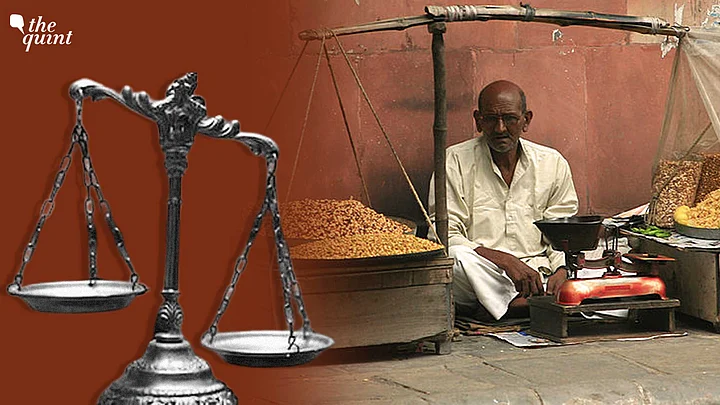Discrimination takes myriad forms including social, economic and religious ones, all originating differently and addressed unequally. Ironically, while the Constitution of India protects the right against social discrimination based on caste, gender and religion, it also allows various laws to discriminate based on what one does to earn a living.
The lived experiences of street vendors, owners of Budget Private Schools (BPS), and farmers are compelling in this regard. When the discrimination is inherent in the law, it operates as state-sanctioned discrimination.
Times When Law Has Scaled Down Street Vendors
A street vendor selling pakodas is an entrepreneur like any other but the law doesn’t treat him/her as one. He/she is entitled to the ease of doing business as much as a large industry. While an industry will get the benefit of deemed approval if its application isn’t rejected within the stipulated time, the same law is selective with regard to vendors.
On one hand, the declaration of vending zones is mandated by the law while on the other, vendors are kept waiting endlessly on their licensing renewal applications. The law assumes that every locality, street and public space is a no-vending zone unless explicitly declared.
The Bombay High Court in 2014 observed street vendors to be the ones creating "…dirt and nuisance”; the Delhi High Court in 2017 saw them as a threat to the public's safety in a ‘public space’. A recent survey by the Centre for Civil Society revealed that 71 percent of the evicted street vendors in Delhi were evicted without a reason and none was given the 30-day eviction notice as the law mandates.
Vendors are labeled ‘encroachers' but private cars, potted plants and security guard cabins occupying space outside the residence are not objected to.
Unequal Treatment Towards Private Schools
Street vendors are not the only ones suffering state-sanctioned discrimination. The law is lenient on government schools but adopts an iron fist for private schools. A private school can be ordered shut for lack of a building with the required specifications— fire extinguisher, or functional toilet while a non-compliant government school can attract more budget allocation!
The department that runs government schools also grants permission to private schools to compete with government schools, thus, creating a conflict of interest. Private schools must run non-profit but pay for utilities including electricity at commercial rates.
25 percent seats in private schools are nationalised and compensated for later than due date, if at all. Children studying in government schools are entitled to free bags, meals, books, uniforms and bicycles but there is no such provision in private schools.
Both are ‘equal’ citizens per the Constitution but children studying in government schools are treated ‘first among equals’. The same is true for teachers for those employed in the private sector are not entitled to any training.
The bias within the law becomes apparent in mainstream journalism's portrayal of private schools. They are treated as villains and labeled ‘teaching shops’ ‘profiteering’ out of a noble profession and ‘mushrooming’ in every nook and corner. This portrayal completely disregards that a sizeable population primarily from low-income groups voluntarily send their children to these schools for them to benefit from quality education.
Limitations on Indian Farmers Prompt Them To Devise Exit Strategies
A similar bias operates against farmers. All Indians depend on farmers’ produce for their meals, but farmers cannot own land beyond the limit prescribed by various land ceiling laws contained in the Ninth schedule.
This keeps farmers from expanding their businesses and achieving economies of scale. An industrialist on the other hand, can set up multiple factories and own multiple houses. Unlike an Indian farmer, a Bangladeshi farmer is free to embrace biotechnology and sow Bt Brinjal, and earn six times his/her Indian counterpart.
An Indian farmer is not free to choose seeds or the market to sell his/her produce, echoing the Tinkathia system of Indigo farming the British had imposed on farmers and the one Gandhi had opposed. Diamonds and rubies can be freely exported but not wheat and onions.
A farmer can’t benefit from higher prices in the international market. Starved of choice, a farmer would rather exit the sector, another avenue made difficult by law. A farmer can neither lease land nor sell it. Law perpetuates slavery. It is no surprise then that the label of 'annadata’ for Indian farmers has become a suicidal burden.
It is time to make good the promise to assure 'dignity of the individual’ as enshrined in the Constitution. Along with caste, gender and religion, livelihood must also be regarded as a facet of an individual's identity. Let no public interest mandate trump individual dignity and no law exploit citizens based on their livelihood choices.
The laws should be an antidote for discrimination and not perpetuate it to uphold the constitutional value of equality guaranteed to all.
(Sehar is a Research Associate and Prashant is a Senior Fellow at the Centre for Civil Society. This is an opinion piece and the views expressed above are the author’s own. The Quint neither endorses nor is responsible for the same.)
